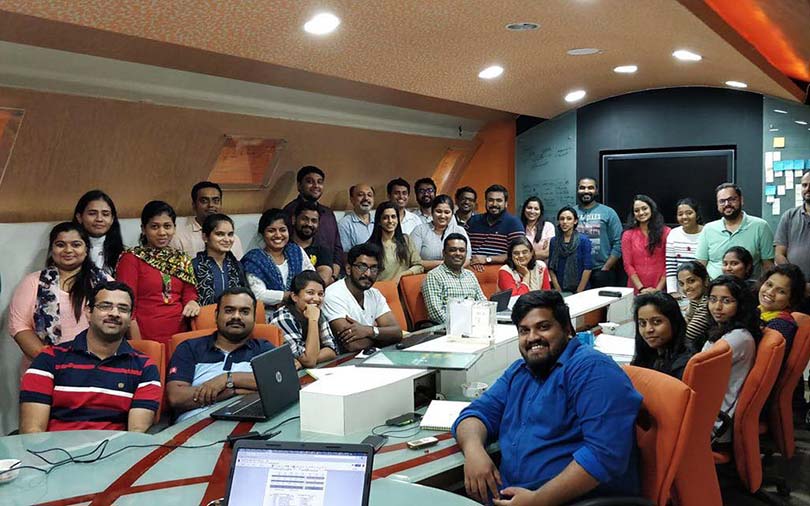
This startup is using AI to help parents find a career for their children


Are you worried about your son’s or daughter’s career? Do they have the attention span of a fly? Are you confused whether they should take up sports, arts or studies?
These are some questions that have crossed the mind of parents at least once. And often this leads to parents and their children going to counsellors to identify the problem and end up with a huge bill. Worse, the problem remains unidentified and leads to very unhappy times for the family.
Parentof Solutions Pvt. Ltd, a startup founded in August 2015 by Swaroop Madhavan, Dr Manohar Chikkanna and Dhanjay Prabhu, and incorporated in Bengaluru, claims that it has answers to all such parenting problems.

“We are building the world’s first decision sciences technology based on artificial intelligence that will resolve almost all parenting issues,” Madhavan told TechCircle in an interview.
According to him, globally, parents spend an average $77,000 to raise a child and 81% of the same is invested in education, healthcare and entertainment. In India alone, he said, that over 100 million parents are consuming over $40 billion worth of products and services for their children online.
“This not only shows the market potential but also the importance we attach to raising a child,” he explained.

Madhavan had earlier helped co-found a company called Quantam Leap that provided specialised learning solutions for large enterprises.
Mai the AI and its ARC engine
Madhavan and his team started off with the idea of building an artificial intelligence (AI)-enabled assistant that would be the Siri for parents. In order to do so, they needed to form algorithm models, collect data and form a strategy on how to make proper recommendations.

“Because we had to teach the AI to think more like a counsellor first, we started by collecting data from them in the form of questionnaires. Primarily, we asked what questions were they likely to ask if they received different complaints from parents around their child’s behaviour,” Madhavan said, adding that they also started meeting parents to understand what real-life problems they were facing and what questions they were likely to ask the counsellor.
Once he and his team had the data, they started creating the algorithms necessary for the AI, which was in the form of a chatbot and also started training the AI via neural networks. After this, they started testing the AI for six months.
However, they needed to be very sure of the recommendations being provided by the Chabot, which they named Mai. This is when they partnered National Institute of Mental Health and Neuro Sciences (Nimhans) to test the AI models.

“Nimhans’ head of research and development, Dr Shoba Managoli, and her team ran simulations along with us for the next six months, after which we were certified by the hospital,” Madhavan said.
Following this, just to test Mai, Madhavan said that his company started working with 30 schools in Bengaluru and that experiment saw a school named Green Country Public improve its academic performance by 44% in just 60 days.
“This is when we realised that our AI engine, which curates and analyses data and recommends actions, was baseline ready and that’s why we called it the ARC (analysis, recommendation and curation) engine,” he said.

Acquisition of Pupilpod
But Mai and Madhavan had another roadblock – how to personalise the AI for every child? This would require more data of students and their activities.
In turn, this led Madhavan to acquire Pupilpod from Value Point Group. Pupilpod is an education management platform that aims to improves parent-teacher communication and helps in building efficiency in overall school administration.

“Pupilpod is more than just a management platform. It helps capture all kinds of data including how the child is performing in different areas and also inputs from parents,” Madhavan said, adding that it acts as a strong trigger to enhance ARC engine capabilities and provide access to a multicultural demographic user base for Mai to build its mass.
Pupilpod currently empowers over 200 schools, across four regions: Dubai, Malaysia, Singapore and India. More than 80 million messages have been exchanged via the platform, which currently has an annual revenue of $500,000 (Rs 3.56 crore), Madhavan said.
“The strategy is to expand Pupilpod to more schools and other institutions training children in sport, arts and music so that Mai can offer recommendations on such careers too while keeping it free for parents,” he explained. Madhavan had earlier tried a subscription fee plan for parents which didn’t work out to the company’s satisfaction, leading to the decision of keeping it free.
Madhavan said that they were approaching schools via Federation of Indian Chambers of Commerce and Industry (Ficci), industry chamber Assocham and education departments of various state governments such as Andhra Pradesh, Telangana, Karnataka and Tamil Nadu.
However, Pupilpod is not Parentof’s last straw. Madhavan said that he was also working with foreign institutes’ research wings to gather more data and train Mai to become better.
The company is also looking to give voice computing abilities to Mai. “We are soon planning to make Mai available on Alexa and Google Assistant. Mai can be called upon service across devices such as Google Home and Echo,” he said.
Investments, financials and raising capital
Parentof has raised till date a total of $1 million from investors in the UK, US and India. The investors include former managing director of Qualcomm Ventures, Karthee Madasamy, chairman and managing director of Value Point Group, RS Shanbhag, Zaikenn fund investing partner, Hari Pabbathi, and ex-councillor of UK’s Watford Borough Council, Shanaz Ali.
In terms of revenue, Pupilpod serves as the only source which Madhavan expects to reach $1.5 million by expanding to 1,000 schools across Asia in 2019.
He also said that his company was looking to raise somewhere between $1 and $3 million in order to develop more expertise around Mai.
